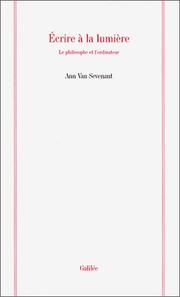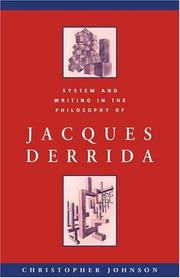| Listing 1 - 9 of 9 |
Sort by
|

ISSN: 07682395 ISBN: 2718605138 9782718605135 Year: 1999 Volume: *29 Publisher: Paris: Galilée,
Abstract | Keywords | Export | Availability | Bookmark
 Loading...
Loading...Choose an application
- Reference Manager
- EndNote
- RefWorks (Direct export to RefWorks)
Philosophy --- Methodology. --- Writing --- Philosophy. --- Writing - Philosophy.
Book
ISBN: 2351200055 9782351200056 Year: 2006 Volume: *2 Publisher: Grignan: Complicités,
Abstract | Keywords | Export | Availability | Bookmark
 Loading...
Loading...Choose an application
- Reference Manager
- EndNote
- RefWorks (Direct export to RefWorks)
Il s'agit là d'un livre sur la lecture et l'écriture. Son véritable thème est cependant l'impertinence, voire l'impossibilité. A quoi bon, en effet, écrire sur la lecture quand il suffit de lire ? Et que peut-on dire de plus sur l'écriture si l'on écrit déjà ? Ainsi ce livre ne comportera-t-il, à proprement parler, aucune matière, et ne transmettra-t-il essentiellement qu'un mouvement : celui de la lecture des testes des autres et de l'écriture qu'elle entraînera. Seul le mouvement peut changer une impossibilité en possibilité, voire en nécessité. Ayant compris, dans une vie antérieure de lecteur, l'impossibilité du Tractatus de Wittgenstein comme livre de pensée, on touchera ici à la nécessité qu'il soit écrit. Puis on explorera, avec " Pierre Ménard, auteur, du Quichotte ", une curieuse possibilité, celle que cette nécessité d'écrire soit le fait du lecteur et non pas de l'auteur. Enfin on aboutira, avec Joseph Joubert et Maurice Blanchot, à l'impossibilité d'écrire, c'est-à-dire à la question de la possibilité de la littérature posée enfin avant celle de la philosophie. C'est en effet avec Blanchot que s'ouvrira le passage entre la philosophie et la littérature et que l'engin de l'écriture atteindra sa " vitesse de libération ". Il prendra alors tout son sens d'une écriture postérieure qui, bien qu'elle fasse suite à l'impossibilité de la pensée, n'en a plus forcément besoin du " pré-texte ". C'est le moment où l'on conçoit, avec Blanchot, " que, dans une œuvre littéraire, on puisse exprimer des pensées aussi difficiles et d'une forme aussi abstraite que dans un ouvrage philosophique, mais à condition qu'elles ne soient pas encore pensées ".
Literature --- Writing --- Reading --- Philosophy --- Blanchot, Maurice --- Criticism and interpretation --- Philosophical Essay --- Literature - Philosophy --- Writing - Philosophy --- Reading - Philosophy --- Blanchot, Maurice - Criticism and interpretation
Book
ISBN: 9782296126688 2296126685 Year: 2010 Publisher: Paris: L'Harmattan,
Abstract | Keywords | Export | Availability | Bookmark
 Loading...
Loading...Choose an application
- Reference Manager
- EndNote
- RefWorks (Direct export to RefWorks)
Penmanship --- Writing --- Ecriture --- Writing materials and instruments --- History --- Philosophy --- Study and teaching --- Writing materials and instruments - History --- Writing - Philosophy --- Penmanship - Study and teaching - History
Book
ISBN: 1282481258 9786612481253 1443815578 9781443815574 9781443813624 1443813621 9781443816373 144381637X 9781443813495 1443813494 9781282481251 6612481250 1443897418 9781443897419 Year: 2016 Publisher: Cambridge: Cambridge scholars,
Abstract | Keywords | Export | Availability | Bookmark
 Loading...
Loading...Choose an application
- Reference Manager
- EndNote
- RefWorks (Direct export to RefWorks)
Melodies, Rhythm and Cognition in Foreign Language Learning is a collection of essays reflecting on the relationship between language and music, two unique, innate human capacities. This book provides a clear explanation of the centrality of melodies and rhythm to foreign language learning acquisition. The interplay between language music brings to applied linguists inquiries into the nature and function of speech melodies, the role of prosody and the descriptions of rhythmical patterns in verbal behaviour. Musical students seem to be better equipped for language learning, although melodies and rhythm can benefit all types of students at any age. In fact, in this book melodies and rhythm are considered to be a springboard for the enhancement of the learning of foreign languages.
Literature -- Philosophy. --- Literature. --- Self in literature. --- Writing -- Philosophy. --- Second language acquisition. --- Music in education. --- Music and language. --- Language and music --- Language and languages --- Education --- Second language learning --- Language acquisition --- Literature --- Writing --- Philosophy.
Book
ISBN: 1487539452 1487539444 1487508980 Year: 2021 Publisher: Toronto, Ontario : University of Toronto Press,
Abstract | Keywords | Export | Availability | Bookmark
 Loading...
Loading...Choose an application
- Reference Manager
- EndNote
- RefWorks (Direct export to RefWorks)
"The Hebrew Bible is a philosophical testament. Abraham, the first biblical philosopher, calls out to the world in God's name exactly as Plato calls out in the name of the Forms. Abraham comes forward as a critic of pagan thought about, specifically, persons. Moses, to whom the baton is passed, spells out the practical implications of the Bible's core anthropological teachings. In Persons and Other Things Mark Glouberman explores the Bible's philosophy, roughing out in the course of a defence of it how men and women who see themselves in the biblical portrayal (as he argues that most of us do once the "religious" glare is reduced) are committed to conduct their personal affairs, arrange their social ties, and act in the natural world. Persons and Other Things is also the author's testament about the practice of philosophy. Glouberman sets out, and in the chapters that pursue the theme he puts into practice, the lessons he has acquired as a lifelong learner about thinking philosophically, about writing philosophy, and about philosophers. Persons and Other Things looks closely at the Bible as a philosophical work, asking insightful questions about how to interpret the Hebrew Bible, what it means to be Jewish, and how to live a meaningful and moral life."--
Jewish philosophy. --- Bible. --- Philosophy. --- Christopher Hitchens. --- God in the Hebrew Bible. --- Jewish. --- Judaism. --- halakhah. --- metaphysics. --- monotheism. --- ontology. --- persons. --- philosophy. --- religion and religiosity. --- the category of the particular. --- writing philosophy. --- Religion.
Book
ISSN: 0298315X ISBN: 9782204084901 2204084905 Year: 2008 Volume: *5 Publisher: Paris: Cerf,
Abstract | Keywords | Export | Availability | Bookmark
 Loading...
Loading...Choose an application
- Reference Manager
- EndNote
- RefWorks (Direct export to RefWorks)
A son corps défendant, l'humain se découvre animal. Mais comment se dire humain ? Jadis, la question se posait avec une urgence et une acuité terribles parce que l'on se sentait toujours trop proche de cet animal que l'on devait tuer pour pouvoir s'en nourrir, et la réponse était celle qu'apportait le rituel du sacrifice sous l'horizon du divin. Avec le temps, cette organisation rituelle va considérablement évoluer, notamment à l'occasion de la diffusion des pratiques de l'écriture, entraînant une redéfinition radicale de l'humain. Aujourd'hui, cette redéfinition a pris une ampleur telle que l'expérience vécue de l'animalité a pratiquement disparu dans nos sociétés. Mais l'inquiétude demeure : l'homme se sait différent, mais il ne sait plus de quoi il diffère au juste. L'Humanité tragique explore la part que prend l'écriture dans cette redéfinition radicale de l'humain, en décrivant l'émergence conjointe de la démocratie athénienne et du théâtre tragique. En effet, c'est à travers des pratiques singulières d'écriture que la cité a forgé des moyens révolutionnaires pour évacuer l'autre en soi et affirmer l'humain en montrant l'inhumain : ainsi naît le théâtre tragique. Dans cette perspective, Frank Pierobon propose, dans la dernière partie de l'ouvrage, une discussion des principaux concepts de la Poétique d'Aristote.
Theory of knowledge --- Writing --- Tragic, The. --- Ecriture --- Tragique --- Philosophy. --- Philosophie --- Aristotle. --- Philosophy --- Tragic, The --- Chirography --- Handwriting --- Aristoteles. --- Ἀριστοτέλης. --- Language and languages --- Ciphers --- Penmanship --- Writing - Philosophy --- Aristotle. - Poetics --- Aristote (0384-0322 av. J.-C.). Poétique --- Humanité --- Écriture --- Théâtre antique --- Anthropologie philosophique

ISBN: 0521448522 052141492X 0511553951 0511880294 9780521448529 9780511553950 9780521414920 Year: 1993 Volume: 40 Publisher: Cambridge: Cambridge university press,
Abstract | Keywords | Export | Availability | Bookmark
 Loading...
Loading...Choose an application
- Reference Manager
- EndNote
- RefWorks (Direct export to RefWorks)
This is an important, critical analysis of Derrida's theory of writing, based upon close readings of key texts ranging from his stringent critique of structuralist criticism to his sympathetic and dialogical analysis of Freud's scriptural models. It reveals a dimension of Derrida's thinking which, although consistently present in his works, has been neglected in favour of those 'deconstructionist' clichés used in much recent literary criticism. Christopher Johnson highlights the special character of Derrida's philosophy that comes from the fertilising contact that Derrida has had with contemporary natural science and with systems theory. In addition, he shows how Derrida's philosophy of system and writing rejoins an atomist and materialist tradition repressed by centuries of idealist metaphysics. This study casts fresh light on an exacting set of intellectual issues facing philosophy and critical theory today.
Derrida, Jacques --- Writing --- System theory --- Philosophy. --- Philosophy --- Derrida, Jacques, --- Chirography --- Handwriting --- Language and languages --- Ciphers --- Penmanship --- Systems, Theory of --- Systems science --- Science --- Derrida, Jacques. --- Derrida, J. --- Derida, Žak --- Derrida, Jackes --- Derrida, Zhak --- Deridah, Z'aḳ --- Deridā, Jāka --- Dirīdā, Jāk --- Деррида, Жак --- דרידה, ז'אק --- Arts and Humanities --- Literature --- Writing - Philosophy --- Derrida, Jacques, - 1930-2004 --- System theory.
Book
ISBN: 2866456270 9782866456276 Year: 2006 Volume: *3 Publisher: Paris: Le Félin-Kiron,
Abstract | Keywords | Export | Availability | Bookmark
 Loading...
Loading...Choose an application
- Reference Manager
- EndNote
- RefWorks (Direct export to RefWorks)
Existentialism. --- Writing --- Existentialisme --- Ecriture --- Philosophy. --- Philosophie --- Kierkegaard, Sren, --- Criticism and interpretation. --- Biography --- Psychology. --- Existentialism --- Philosophy and culture --- Philosophy --- Kierkegaard, Søren, --- Criticism and interpretation --- Psychology --- Danish Philosophy --- 19th Century --- Critical Essay --- Writing - Philosophy --- Kierkegaard, Søren, - 1813-1855 - Criticism and interpretation --- Kierkegaard, Søren, - 1813-1855 - Psychology --- Kierkegaard, Søren, - 1813-1855 --- Critique et interprétation --- Kierkegaard, Søren, 1813-1855
Book
ISBN: 9782713223181 2713223180 Year: 2011 Volume: 1 Publisher: Paris: École des hautes études en sciences sociales,
Abstract | Keywords | Export | Availability | Bookmark
 Loading...
Loading...Choose an application
- Reference Manager
- EndNote
- RefWorks (Direct export to RefWorks)
Automne 1968 : Foucault, à l'invitation du critique Claude Bonnefoy, rencontre celui-ci à plusieurs reprises en vue d'un projet de livre. Ce n'est ni à un entretien, ni à un dialogue auquel les deux hommes se livrent, mais à un exercice de parole inédit ; Foucault pour la seule fois de sa vie donne à voir ce qu'il désigne comme "l'envers de la tapisserie", son propre rapport à l'écriture.
Writing --- Ecriture --- Philosophy --- Philosophie --- Foucault, Michel, --- Interviews. --- Chirography --- Handwriting --- Language and languages --- Ciphers --- Penmanship --- Foucault, M. --- Foucault, Michel --- Fūkūh, Mīshīl, --- Foucault, Michael, --- Fuko, Mišel, --- Pʻukʻo, --- Pʻukʻo, Misyel, --- Phoukō, Misel, --- Fuke --- 福柯 --- Fuḳo, Mishel, --- Fūkūh, Mīshīl, --- Fuko, Mišel, --- Pʻukʻo, --- Pʻukʻo, Misyel, --- Phoukō, Misel, --- 福柯 --- Fuḳo, Mishel, --- Writing - Philosophy - Interviews --- Foucault, Michel, - 1926-1984 - Interviews --- Foucault, Michel, - 1926-1984 --- Foucault, Michel (1926-1984) --- Entretiens --- Philosophy.
| Listing 1 - 9 of 9 |
Sort by
|

 Search
Search Feedback
Feedback About UniCat
About UniCat  Help
Help News
News